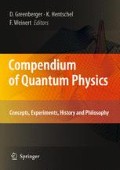In standard quantum theory, the projection postulate plays a crucial but controversial role: crucial, because standard quantum theory makes contact with physics and the results of experiments via the measurement axioms of quantum theory, the most important of which is the projection postulate; and controversial, because the projection postulate appears to conflict with Schrödinger’s equation. This apparent conflict is the notorious measurement problem of quantum mechanics, or, what amounts to the same thing, the paradox of ►Schrödinger’s cat. See also ►Bohmian mechanics; Measurement theory; Metaphysics in Quantum Mechanics; Modal Interpretation; Objectification.
A variety of proposals have been put forward for resolving the measurement problem. For many of these, whether in fact they do solve the problem remains highly controversial. Two proposals that clearly resolve the measurement problem are the ►GRW theory and the ►pilot-wave formulation of quantum mechanics (►Bohmian mechanics). In the former, collapse of the wave function during measurement is achieved, and the projection postulate recovered, by a stochastic modification of the Schrödinger dynamics on the microscopic level [3]. (See Consistent histories, Ignorance interpretation, Ithaca Interpretation, Many Worlds Interpretation, Modal Interpretation, Orthodox Interpretation, Transactional Interpretation).
Access this chapter
Tax calculation will be finalised at checkout
Purchases are for personal use only
Primary Literature
P. A. M. Dirac: The Principles of Quantum Mechanics (Oxford University Press, Oxford 1930)
J. von Neumann: Mathematische Grundlagen der Quantenmechanik (Springer, Berlin 1932); English translation by R. T. Beyer: Mathematical Foundations of Quantum Mechanics (Princeton University Press, Princeton 1955)
G. C. Ghirardi, A. Rimini, T. Weber: Unified Dynamics for Microscopic and Macroscopic Systems, Physical Review D 34, 470–491 (1986)
D. Dürr, S. Goldstein, N. Zanghì: Quantum Equilibrium and the Role of Operators as Observables in Quantum Theory, Journal of Statistical Physics 116, 959–1055 (2004), quant-ph/0308038
Secondary Literature
D. J. Griffiths: Introduction to Quantum Mechanics (Benjamin Cummings, San Francisco 2004)
R. Shankar: Principles of Quantum Mechanics (Springer, Berlin 1994)
Author information
Authors and Affiliations
Editor information
Editors and Affiliations
Rights and permissions
Copyright information
© 2009 Springer-Verlag Berlin Heidelberg
About this chapter
Cite this chapter
Goldstein, S. (2009). Projection Postulate. In: Greenberger, D., Hentschel, K., Weinert, F. (eds) Compendium of Quantum Physics. Springer, Berlin, Heidelberg. https://doi.org/10.1007/978-3-540-70626-7_151
Download citation
DOI: https://doi.org/10.1007/978-3-540-70626-7_151
Published:
Publisher Name: Springer, Berlin, Heidelberg
Print ISBN: 978-3-540-70622-9
Online ISBN: 978-3-540-70626-7
eBook Packages: Physics and AstronomyPhysics and Astronomy (R0)

